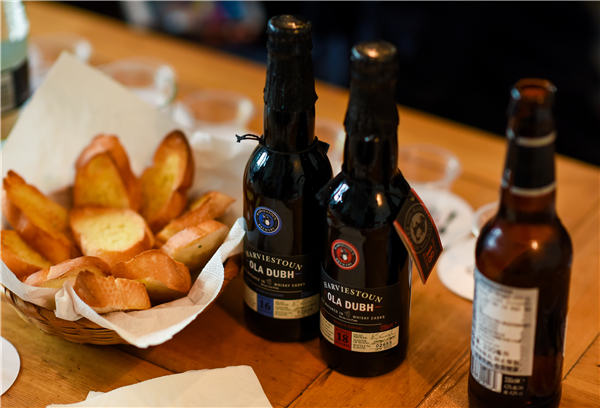Who knew Old Engine Oil could be so delicious?
 |
|
Photo provided to China Daily |
Ola Dubh 16 is my new best friend Old Engine Oil, but instead of putting it right into the bottle, the brewers siphoned it into a whisky cask and let it rest in that barrel for 16 years. Oh, my glory! The goodness just magnifies itself in the "18" and "30" - though before you fall in love with the 30th edition, you should know it's pricy stuff (about $50 - that's US dollars - for a single bottle).
We're invited to drink it from a whisky glass, which may have been more about ambience than enhancing flavor. The sharp flavor of the whisky barrel makes a nice foil for any of the cheeses we're nibbling.
Cheddar, we're told, is a place and thus the word deserves capitalization. Six generations there have been churning out what is said to be the world's oldest cheese, using the same dairy culture the family started with in 1833.
Macdonald instructs us to "mush it" with our fingertips to bring out the fullest flavor, and it wasn't long before our group, initially hesitant, was having fun playing with our food. Another hit is the Red Leister, which Macdonald says is popular in China because of its nutty and almost meaty flavor. It has a reddish color thanks to the addition of anatto, an orange-red condiment and food coloring derived from the seeds of the achiote tree.
The Stilton, of course, is one of Britain's most famous cheeses: bitter and masculine, a nice match for a rich beer or even a sweet wine. It gets its blue veins from tiny holes made in the outer crust, which allow a sprinkling of penicillin bacteria to penetrate and "blossom" through the cheese. When well-made, like the wedge we're sampling, Stilton's veins are evenly spread out.
Many of these cheeses and the accompanying brews from Harviestoun are available in Western grocers and restaurants around China.
The distribution is growing, as marketers try to capitalize on a growing interest in British food products, fed by the 2012 Olympics and the recent visit to London by China's President Xi Jinping.
The author is a food writer for China Daily Life
















